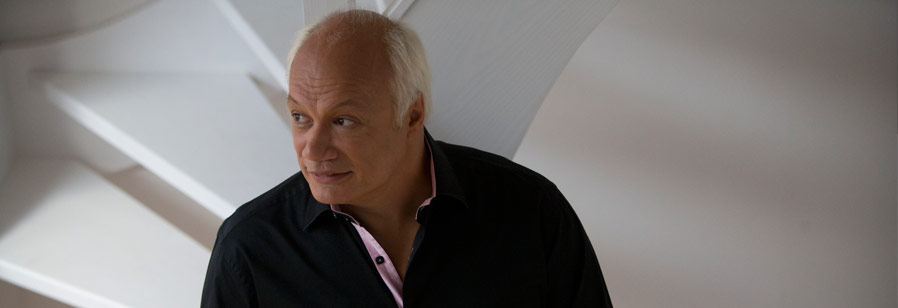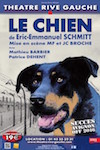Masterclass
Trailers
Monsieur Ibrahim et les Fleurs du Coran
x (x)
x (x)
x (x)
x (x)
x (x)
x (x)
View all trailers
The Dog
FROM 1 OCTOBER 2016
By Eric-Emmanuel Schmitt
Directed by Marie-Françoise and Jean-Claude BROCHE
With
Mathieu BARBIER
Patrice DEHENT
“If men are naïve enough to believe in God, dogs are naïve enough to believe in men”.
So, what is the secret that shackles Samuel Heymman’s soul, a universally respected doctor but someone even his daughter finds hard to fathom? What lies behind the extraordinary bond that has linked him with his dogs for 40 years?
Presented like a thriller, this moving play explores the manifold forms of communication between living beings: love, hate, revenge and forgiveness. An arresting and disturbing lesson on humanity that enjoyed huge success at the 2016 Avignon Off Festival.
DIRECTOR’S NOTE
What attracted us above all to Eric-Emmanuel Schmitt’s “The Dog” was its profound humanism. Offering relatively little in the way of dialogue, the novella prompted us to find the most efficient and faithful means of adapting it for the stage.
A man commits suicide after the accidental death of his dog. The strength of the bond between the two is a mystery to everyone, most of all to his only daughter and her partner.
The novella is structured in two parts, and our first task, as directors and adaptors for the stage, was to bring the two parts together in the space and time of the theatre.
A spare, uncluttered set, gentle lighting, sincere, pared-down acting and a strong text leave audiences free to use their imagination and create the universe for themselves.
We used the interplay of the actors’ eye contact and stage moves to build up the dialogue between the narrator and his doctor-friend, who have not seen each other for five days at the point when the narrative begins with the doctor’s violent death.
A long letter written by Samuel Heymann to his daughter and received after his death by his writer-friend opens up communication between these sensitive characters. The letter becomes a kind of “go-between”, a valve that takes on a life of its own and allows the deceased man to be embodied on stage. Death breaks down Samuel Heymann’s wall of silence, and his past becomes our present in a dramatic flashback.
The actor needs to reveal himself as intimately and sincerely as he can, and he then takes audiences on a journey, with the author as the supreme guide but where the written secrets are turned into verbal secrets, in the interests of a staged production.
The aim of our adaptation was to stay as true to the original novella as we could, and the audience thus witnesses the unveiling of one man’s enigmatic life and the touching, empathic understanding of his dog.
We see the book as a kind of fusion of the author’s skill and imagination and the conscious, private feelings of his readers, and in the same way, we want audiences to be guided by the actors so that they become the creators of their own internal cinema.
For us, it’s essential to maintain for as long as possible the subtlety of the suspense intended by the author.
Marie-Françoise and Jean-Claude BROCHE
AUTHOR’S NOTE
Sometimes, directors can see drama where the author hadn’t spotted it. When Marie-Françoise and Jean-Claude BROCHE asked to adapt one of my novellas, they took me by surprise. I had written such an intimate and touching story that to my mind, it could only be read in silence. But as I knew them, I decided to risk trusting them. My second surprise was even greater, when I saw their production at the Avignon Festival. The show was performed by two first-rate actors and I found the depths of emotion that had generated the novella, a story that’s especially close to my heart and that I’d spent many years working on. And I reacted like audiences every day: I stood up with tears in my eyes to applaud and express my thanks.
The Dog is about humanity’s dark days. What bizarre cruelty… Man manages to blind himself with ideas. But dogs can’t do that. Aren’t they sometimes more human than humans? They’re not racist, that’s for sure, and never perverted by ideologies.
How is it they still see the victim’s face when his aggressors have cease to notice it?
This novella was inspired by Emmanuel Levinas and casts light among the shadows: a dog’s vision of the world.
Eric-Emmanuel SCHMITT

